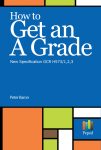Specification H573/3 Pluralism and Society
January 9, 2018
 Here is the OCR specification with hyperlinks applied to make it easy for you to resource the suggested reading. Scroll down and you will find my comments designed to help you understand the key issues in this part of the specification, and how they relate to other two papers, or other parts of Christian Thought. If you wish to understand fully how the specification hangs together, then try my new book – How to Get an A Grade, where I analyse the specification in microscopic detail….available in the peped shop with our new study guides for each paper. Finally, if you need a tutor, we now have tutors available at a fair hourly rate. Just email me for details, peterbaron@peped.org.
Here is the OCR specification with hyperlinks applied to make it easy for you to resource the suggested reading. Scroll down and you will find my comments designed to help you understand the key issues in this part of the specification, and how they relate to other two papers, or other parts of Christian Thought. If you wish to understand fully how the specification hangs together, then try my new book – How to Get an A Grade, where I analyse the specification in microscopic detail….available in the peped shop with our new study guides for each paper. Finally, if you need a tutor, we now have tutors available at a fair hourly rate. Just email me for details, peterbaron@peped.org.
4. Development: Religious pluralism and society
Significant social and historical developments in Christian thought, such as those influenced by ethics, philosophy or studies of religion.
4.1 Content
• the development of contemporary multi-faith societies
• Christian responses to, including:
– responses of Christian communities to inter-faith dialogue
– the scriptural reasoning movement
4.2 Knowledge
• the reasons for the development of contemporary multi-faith societies, for example migration
• how Christian communities have responded to the challenge of encounters with other faiths, for example:
– Catholic Church: Redemptoris Missio 55–57
– Church of England: Sharing the Gospel of Salvation
• the scriptural reasoning movement’s methods and aims
• how the mutual study and interpretation of different religions’ sacred literature can help understanding of different and conflicting religious truth claims
4.3 Issues as the basis of exam questions
Learners should have the opportunity to discuss issues related to Christian responses to multi-faith societies and inter-faith dialogue, including:
• whether or not inter-faith dialogue has contributed practically towards social cohesion
• whether or not Christian communities should seek to convert people from other faiths
• whether or not scriptural reasoning relativises religious beliefs
• whether or not Christians should have a mission to those of no faith
4.4 Suggested scholarly views, academic approaches and sources of wisdom and authority
Learners will be given credit for referring to any appropriate scholarly views, academic approaches and sources of wisdom and authority, however the following examples may
prove useful:
• The Doctrine Commission of the Church of England (1995) The Mystery of Salvation Church House Publishing,
Chapter 7
• Ford, D. (2011) The Future of Christian Theology, Wiley-Blackwell, Chapter 7
• Pope Paul VI (1965) Nostra Aetate; Declaration on the relation of the Church to non-Christian religions






0 Comments